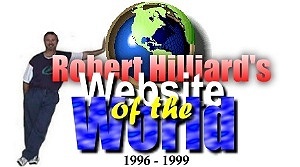If you have a
suggestion or comment,
feel free to send
me e-mail.

Robert Hilliard's Website of the World is featured on such websites as:
ZDNet
Microsoft's MSNBC Technology
miningco.com Orlando, FL.
CMPNet NetGuide
America Online
The Miami Herald
The Dallas Morning News
Peter deJager's Year 2000
BugNet
GeoCities
Massachusetts Institute of Technology
Robert Hilliard's Website of the World has been featured in the following publications:
Web Guide Monthly, (Sept. 1998 Issue)
Rochester Engineer, Rochester Engineering Society, (Oct. 1998)
IFMA Notes, International Facility Management Association, (Sept. 1998)
This website is best experienced with Microsoft Explorer 4.0 (or higher) or Netscape Communicator 4.04 (or higher) at 800X600 display size. Some pages are formatted in frames.
This site

Notice:
The information and material contained on this page are provided "as-is" without warranty of any kind, expressed or implied, including without limitation, any warranty concerning the accuracy, adequacy, or completeness of such information or material or the results to be obtained from using such information or material. Robert E. Hilliard will not be liable for any claims attributable to any errors, omissions, or other inaccuracies in the information or material contained on this page. And in no event shall Robert E. Hilliard be liable for direct, indirect, special, incidental, or consequential damages arising out of the use of such information or material.

About this Website
suggestion or comment,
feel free to send
me e-mail.

ZDNet
Microsoft's MSNBC Technology
miningco.com Orlando, FL.
CMPNet NetGuide
America Online
The Miami Herald
The Dallas Morning News
Peter deJager's Year 2000
BugNet
GeoCities
Massachusetts Institute of Technology
Robert Hilliard's Website of the World has been featured in the following publications:
Web Guide Monthly, (Sept. 1998 Issue)
Rochester Engineer, Rochester Engineering Society, (Oct. 1998)
IFMA Notes, International Facility Management Association, (Sept. 1998)
This website is best experienced with Microsoft Explorer 4.0 (or higher) or Netscape Communicator 4.04 (or higher) at 800X600 display size. Some pages are formatted in frames.
This site


About this Website













On your web page, you state:
*** The Year 2000 is a Leap Year.
***
*** This has been the subject of a lot of debate. When the year is a century
*** (for example when the year ends in 00) the century rule applies. The century
*** has to divide by four. So, 1900 was not a leap year. The year 2000 will be a
*** leap year.
The above may be the subject of a lot of debate, but those who argue that the year 2000 isn't a leap year are simply wrong.
Because the tropical year (the length of time between successive vernal equinoxes) is 365.24219 days in length, it was necessary to make the "leap year" concept more complicated than simply adding a single day every four years (to give a calendar year of 365.25 days, as Caesar decreed with their Julian calendar in 45 BC). However, leap years were not correctly inserted until 8 AD.
After two ill-fated attempts to correct this (one during the rule of Pope Clement IV, the other while Pope Sixtus IV was in power), the Council of Trent authorized Pope Gregory XIII to reform the calendar. The corrections made in 1582 had October 15 follow October 4 (to correct for the cumulative error) and a new rule was adopted that stated that every fourth year is a leap year except for century years that are not divisible by 400. Hence 1700, 1800, and 1900 are not leap years, but the year 2000 is a leap year.
The Gregorian calendar, as it is now called, puts the calendar year at 365.2425 days, which puts the calendar year 0.00031 days (26.784 seconds) longer than the tropical year.
*** Nobody has worked out if there will need to be a correction for the
*** year 4000.
The next leap century will actually be 2400 AD, as a leap century happens ever 400 years. From the discussion above, the current leap year algorithm adds an extra day about every 3225.8 years. Britian and her colonies didn't make the current leap year change until 1752 (where they skipped 12 days and went from September 2 to September 14), so we will have to subtract a leap year (a day) sometime before 4978 AD (1752+3226).
Here is the current leap year algorithm:
If a year is evenly divisible by 400, it IS a leap year. If a year is evenly divisible by 100, it is NOT a leap year (with the above exception). If a year is evenly divisible by 4, it is a leap year (with the above exceptions).
The obvious modification would be to add another rule to the top of the list:
If the year is evenly divisible by 3200, it is NOT a leap year.
That would put the calendar year at 365.2421875 days, so the error would be 0.0000025 days per year (assuming that a tropical year of 365.24219 days is accurate), or 1 day in 400,000 years. Maybe we could call it the Sanderson calendar. :-)
Sorry for rambling...thought you (and your web users) might like to know.
Terry P. Sanderson P. Eng.
Supervisor, Workgroup Technology
Computing & Networking Services
University of Toronto Computing
Thanks Terry. I couldn't have said it better myself. - Robert
>Dear Mr. Hilliard,
>
>I have not seen anything about this question (maybe that means is isn't
>a problem, but I guess I'd better ask anyway): What happens if the
>server BIOS is OK, and the PC BIOS can't handle a year 2000 date? Does
>the server get into a fatal argument with the device and forget all
>else? Disconnect the device? We're running NT and Novell. Heard
>anything about this, or know who I should ask?
>
>VERY nice web pages!
>
>Thank you!
>Char Henwood
Hello Char;
I appreciate your comments concerning my website. Feel free to visit anytime and make any suggestions you might have.
Concerning your question. We run both NT and Novell too and in checking with all parties involved, we feel (although we haven't tested it yet), that if the server is Y2K compatible and the workstation is not, it doesn't matter whether it's NT or Novell, the workstation is going to hiccup.
Even though the time and date comes from the server to the workstation, it resides on the PC BIOS in the workstation. So, the workstation will not display the date properly since it won't be able to display the century. This could cause problems especially if the workstation runs applications that need a proper date (i.e., financial or spreadsheet applications). On some workstations, booting up may not be possible.
My advice is for your organization to determine which workstations need to have a BIOS upgrade to handle the year 2000 and upgrade as soon as possible. This is assuming that all your servers are Y2K compatible.
Hope this helps.
- Robert Hilliard
Dear Bob !
Receive greetings from Germany. - I come this way because I still use the Netscape Navigator in the version 3, but only for looking up the Net for interesting home-pages as yours. For my much higher activities concerning e-mails I use with great satisfaction EUDORA LIGHT, so that I didn't configure the Navigator for mailing. -
I found your home-page about PC Compatibility with 'Y2K' through the home-page of our (national) Federal Bureau for Safety of Information-Technology (in my language: Bundesamt fuer Sicherheit in der Informationstechnik; abbreviation is BSI).
They offer quite a number of solutions especially for Federal Authorities and the industry to face and solve the upcoming problem with Y2K. I worked (past !) for more than 12 years in our MOD (long term defence planning on personell and infrastructure) and know pretty well the problems which could arise when our very complicate plans (all EXCEL-spreadsheets) would not stick to the correct date and time schedules.
Therefore 'thank you' for getting people awake in time to test their equipment and to plan for alternatives if necessary. - For my part: the BIOS of my Home PC is OK, and I filled in the items in your home-page and submitted it sucessfully. My motherboard works with the 'Award Modular BIOS dated 08/21/96 v4.51PG' as I have sent it for your database. -
But to repeat these data is not the reason mailing to you. I especially would like to express my respect for your home-page(s) concerning Y2K !! You show that even on this more or less 'dry' subject it is possible to create a home-page which pleases brain and eyes: optically great and very interesting to read ! - Although my HP DeskJet (still '500 Series') only knows "black" and "not black", I printed some of your pages because I think that they are marvellous. --
Thank you again and many kind greetings !
Yours, Horst Kuske (alias Hokus....).
(By the way: 'Hokus' was [decades ago] my nickname when I - at age of 14 - became one of the first Boy Scouts in Germany right after World War II. It was not too difficult to create it just taking the right parts of HO(rst) KUS(ke) together. And when getting 'online' about 2 years ago it was the obvious thing to use it again as my 'alias', wasn't it ?) ---
I am flattered by your comments, Horst. Thank you for visiting my Y2K website and feel free to give me any comments or suggestions in the future. - Robert
Robert,
I stumbled across your web page and read what you had to say, I find it hard to believe that the USA could let something that terrible happen to our nation.
I believe that it could happen, anything could happen, and I hope that this doesn't happen. Do you really think that this is going to happen, are you an alarmist, I don't mean to sound rude but there are so many people saying to get ready for this and get ready for that and a lot of people do crazy things and what they predict never happens. I want to be prepared just like the next guy and protect my family, so again do you think this thing is really going down, could it be more milder than you think or do you really think in your heart it's going to get really bad? I would appreciate any information that you have regarding this matter.
Thank You.............Rick
Hello Rick:
Thanks for writing. Where do I start? I am certainly not an alarmist, and I am not predicting doom and gloom, but your life WILL be effected in someway by the Year 2000 date crisis.
Even if you have achieved Y2K compliancy with your computers at home, there will be other computers in the world that you unknowingly rely on, that will fail.
This could effect your travel plans, what items you buy from various vendors, your bank account, etc. Although I am certainly not predicting a stock market failure or a loss of electrical power or a famine, I think we all will be inconvenienced in some way for a short period of time, at least until we have uncovered all the date problems and rectified them.
Believe me Rick, the Year 2000 date crisis is real and needs to be dealt with. With all of us working together, we can lick the problem.
Regards, - Robert

